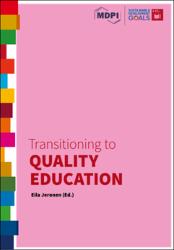| dc.contributor.author | Karakaş, Hamdi | |
| dc.date.accessioned | 2022-05-11T12:13:27Z | |
| dc.date.available | 2022-05-11T12:13:27Z | |
| dc.date.issued | 2021 | tr |
| dc.identifier.citation | Karakaş, H. (2021). Start for sustainable development: Ecological footprint. E. Jeronen (Ed.) In Transitioning to Quality Education (pp:89-113), Edited by Transitioning to Sustainability Series 4. Basel: MDPI. | tr |
| dc.identifier.isbn | 978-3-03897-893-0 | |
| dc.identifier.issn | 2624-9332 | |
| dc.identifier.uri | https://hdl.handle.net/20.500.12418/12811 | |
| dc.description.abstract | The aim of this study is to investigate the relationship between elementary school students’ ecological footprint mean scores and their attitudes towards sustainable development. Two hundred and ten elementary school students from three different regions of Turkey (east, middle and west) were included in the study group. As a result of the research, the mean ecological footprint scores of elementary school students were calculated as 2.11 global hectare (gha) and their ecological footprint has been determined to be lower than Turkey’s mean (2.7 gha), but higher than the world mean (1.8 gha). The mean score of attitude towards sustainable development of elementary school students was calculated (X = 3.62), and the low mean score showed that elementary school students did not exhibit the expected sustainable development attitude. A negative correlation was determined between the mean scores of ecological footprints of elementary school students and the mean scores of sustainable development attitude and it was concluded that this relationship was significant. This result shows an inverse relationship between ecological footprint and sustainable development for elementary school students. Achieving sustainable development is primarily possible by changing the consumption habits of individuals. This can be achieved with SDG goal 4 “Quality Education”. Ecological footprint awareness can be used as a tool for the students to become aware of their own consumption habits, to develop the characteristics expected from it and thus to create sustainable development by using natural resources more effectively. | tr |
| dc.language.iso | eng | tr |
| dc.publisher | MDPI | tr |
| dc.relation.isversionof | 10.3390/books978-3-03897-893-0 | tr |
| dc.rights | info:eu-repo/semantics/openAccess | tr |
| dc.subject | ecological footprint | tr |
| dc.subject | elementary school students | tr |
| dc.subject | sustainable development | tr |
| dc.subject | quality education | tr |
| dc.title | Start for sustainable development: Ecological footprint | tr |
| dc.type | bookPart | tr |
| dc.relation.journal | Transitioning to Quality Education | tr |
| dc.contributor.department | Eğitim Fakültesi | tr |
| dc.contributor.authorID | 0000-0001-9209-4128 | tr |
| dc.identifier.endpage | 113 | tr |
| dc.identifier.startpage | 89 | tr |
| dc.relation.publicationcategory | Uluslararası Kitapta Bölüm | tr |















